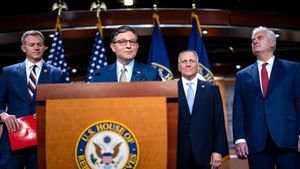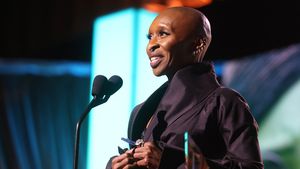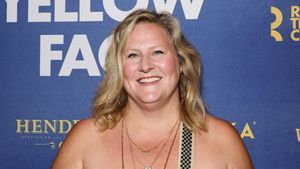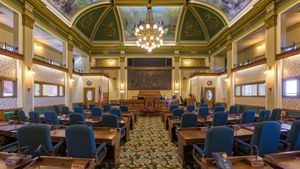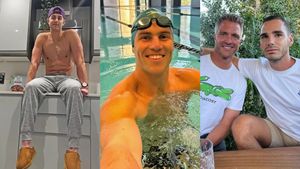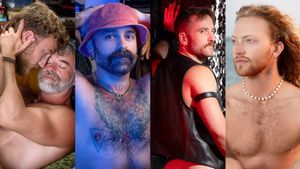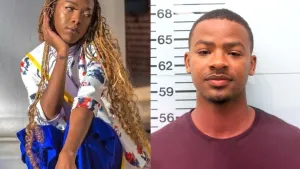
Treatment GuideJust DiagnosedSex & DatingAfrican AmericanStigmaAsk the HIV DocPrEP En EspañolNewsVoicesPrint IssueVideoOut 100
CONTACTCAREER OPPORTUNITIESADVERTISE WITH USPRIVACY POLICYPRIVACY PREFERENCESTERMS OF USELEGAL NOTICE
© 2024 Pride Publishing Inc.
All Rights reserved
All Rights reserved
By continuing to use our site, you agree to our Private Policy and Terms of Use.
In March 2003 the Reverend Roderick Hennings, pastor at Zion Dominion Church in Buffalo, N.Y., devoted his sermon to HIV and AIDS. Then he practiced what he preached'he took an HIV antibody test in front of his entire congregation. Hennings was taking part in Breakthrough Sunday, an effort that began in New York State to bring HIV testing and education to African-American churches. And it worked. At the end of Hennings's service about 300 members of his church followed his example and were tested for HIV. As HIV continues to spread rampantly among African-Americans [see accompanying article, 'Disturbing Statistics'], it has become increasingly clear that the black church has a unique role to play in fighting the epidemic. 'Church is central in our community,' explains Pernessa Seele, founder of the Balm in Gilead, a nonprofit organization formed in 1988 to teach faith leaders about HIV and AIDS. 'It's not just where people go on Sunday; it's a community center. It is where we organize around social and cultural issues.' And people listen to what the church says, Seele adds: 'When the church says go right, people go right. And when it says go left, people go left.' No one knows this better than Vanessa D. Sharp. She was raised in the black church with a father who was a Presbyterian minister, and the church was Sharp's family'and her home. That is why, when Sharp learned she was HIV-positive in 1990, the first thing she did was pray. But she had to pray alone. 'I had heard that my pastor had turned his back on people who had HIV because he thought all people with HIV were gay,' she says. She knew his attitude permeated the beliefs of almost everyone in the church. Today, responding to what she says was God's call, Sharp not only speaks openly about having HIV but is also a divinity student at the Interdenominational Theological Center in Atlanta, a historically African-American school. It was Sharp's interest in seeing how far the church has come in responding to HIV, along with her desire to have her own HIV ministry, that led her to join more than 100 pastors, deacons, and other church leaders in Atlanta last October for a one-day workshop, 'Successful Ministry in the Age of AIDS.' The workshop was specifically designed to provide faith leaders with medically accurate information on HIV prevention, education, and treatment. 'We wanted to give people information that would allow them to stretch their ministry by taking this medically based information and then applying it in a faith-based setting,' says Mary Hess of Minority Health Care Communications, which coordinated the conference. The Balm in Gilead has a similar goal. Its flagship program, the Black Church Week of Prayer for the Healing of AIDS, which will take place March 7'13, now involves more than 10,000 churches and is estimated to reach more than 2.5 million African-Americans. Its educational arm'the Black Church HIV/AIDS Training Institute and Black Church HIV/AIDS Network'creates ongoing opportunities for leaders of church-based HIV programs to share information about their work. Tendai Lynch, who chairs the six-year-old HIV ministry at the First Baptist Church in Norfolk, Va., is one of the network's members. The ministry works with other churches and the local AIDS hospice to provide support to people with AIDS. The members also offer prevention education programs at the church for teens, adults, and seniors. Lynch believes the most important message her church needs to send is that its attitudes have changed. 'People think that once they reveal they are HIV-positive or that someone in their family is suffering from AIDS, other people will not treat them the same,' she says. 'As a church, we are trying to say, 'No, we won't treat you any different.' So we tell our congregation to get tested and'if you find out you are positive'to start seeing a doctor and start taking medication. We will still love you.' Nettie Butler, an HIV educator at Springfield Baptist Church in Thomson, Ga., is also a member of the Black Church HIV/AIDS Network. Butler says her goal in being part of the group is to get HIV education into the community in as many ways as possible. Not only does she teach classes at the church, she says, but when 'we do street-walking witnessing about Jesus, we also shoot some talk about HIV in between that.' Butler believes 'God called me to do this work.' Her efforts were also inspired in part by her gradual realization that her brother, who died in 1986, 'probably didn't die because of a heart attack but because of AIDS. Plus,' she adds, 'the church is so blind. Leaders don't want to talk about HIV, and where I live now is a very rural area, so there's a lot of denial out here. And seeing those statistics [about African-Americans and HIV] just blew my mind.' In 2003, Butler worked with her pastor to plan educational programs during the Black Church Week of Prayer. These activities included placing a banner reading 'AIDS hits the faimily' across the main street of Thomson'the first time anything like that had ever been done in the area. Virtually all pastors now working to address HIV have had to come to terms with how they have dealt with HIV in the past. 'There are incredible stories pastors tell about seeing the light only after blindness'sermons where the congregation is invited to bear witness to the pastor's pain,' says Robert Fullilove III, Ed.D., an associate professor at the Mailman School of Public Health at Columbia University and an expert on HIV and minority health. 'The text in the New Testament says the greatest sin is to deny someone grace or forgiveness or to turn someone away in an hour of need. And when a pastor acknowledges that he has done that, it is a powerful experience.' For Reverend Hennings, that turning point came just two years ago. Prior to that, he says, his sermons addressed HIV only 'lightly.' But then he met four HIV-positive men from Buffalo who explained to him what it felt like to not get any support from the church. 'These men opened my eyes,' he says, 'and they made me realize that the church needed to take the stigma off HIV and to look at it as a disease and not a behavioral manifestation.' Vanessa Sharp still thinks about the pastor she could not turn to when she needed him most. 'Since leaving that church, I have been able to be open about my HIV status in other ministries,' she says. 'But I still have the desire to go back to speak with that pastor. And I know that that is something that will soon come to pass.' Because, Sharp knows, what that pastor says will influence his entire congregation.
From our Sponsors
Most Popular
Why activist Raif Derrazi thinks his HIV diagnosis is a gift
September 17 2024 12:00 PM
How fitness coach Tyriek Taylor reclaims his power from HIV with self-commitment
September 19 2024 12:00 PM
Exclusive: We kiki with Q from 'RuPaul's Drag Race'
June 24 2024 11:37 AM
Out100 Honoree Tony Valenzuela thanks queer and trans communities for support in his HIV journey
September 18 2024 12:00 PM
The freedom of disclosure: David Anzuelo's journey through HIV, art, and advocacy
August 02 2024 12:21 PM
Creator and host Karl Schmid fights HIV stigma with knowledge
September 12 2024 12:03 PM
Activist and philanthropist Bruce Bastian dies at 76
June 26 2024 1:28 PM
In honor of Juneteenth 2024, meet The Normal Anomaly
June 19 2024 1:39 PM
Plus: Featured Video
Latest Stories
Ricky Martin delivers showstopping performance for 2024 World AIDS Day
December 05 2024 12:08 PM
AIDS Memorial Quilt displayed at White House for the first time
December 02 2024 1:21 PM
Climate change is disrupting access to HIV treatment
November 25 2024 11:05 AM
California confirms first case of even more deadly mpox strain
November 18 2024 3:02 PM
Post-election blues? Some advice from mental health experts
November 08 2024 12:36 PM
Check out our 2024 year-end issue!
October 28 2024 2:08 PM
Meet our Health Hero of the Year, Armonté Butler
October 21 2024 12:53 PM
AIDS/LifeCycle is ending after more than 30 years
October 17 2024 12:40 PM
Twice-yearly injectable lenacapavir, an HIV-prevention drug, reduces risk by 96%
October 15 2024 5:03 PM
Kentucky bans conversion therapy for youth as Gov. Andy Beshear signs 'monumental' order
September 18 2024 11:13 AM
Study finds use of puberty blockers safe and reversible, countering anti-trans accusations
September 11 2024 1:11 PM
Latinx health tips / Consejos de salud para latinos (in English & en espanol)
September 10 2024 4:29 PM
The Trevor Project receives $5M grant to support LGBTQ+ youth mental health in rural Midwest (exclusive)
September 03 2024 9:30 AM
Introducing 'Health PLUS Wellness': The Latinx Issue!
August 30 2024 3:06 PM
La ciencia detrás de U=U ha estado liberando a las personas con VIH durante años
August 23 2024 2:48 PM
Tratamiento y prevención del VIH por inyección: Todo lo que necesita saber
August 23 2024 2:41 PM
Sr. Gay World quiere asegurarse de que estés bien
August 23 2024 2:30 PM
Eureka is taking a break from competing on 'Drag Race' following 'CVTW' elimination
August 20 2024 12:21 PM
With a new case in Sweden, what is the new mpox outbreak and should you be concerned?
August 15 2024 4:48 PM

































